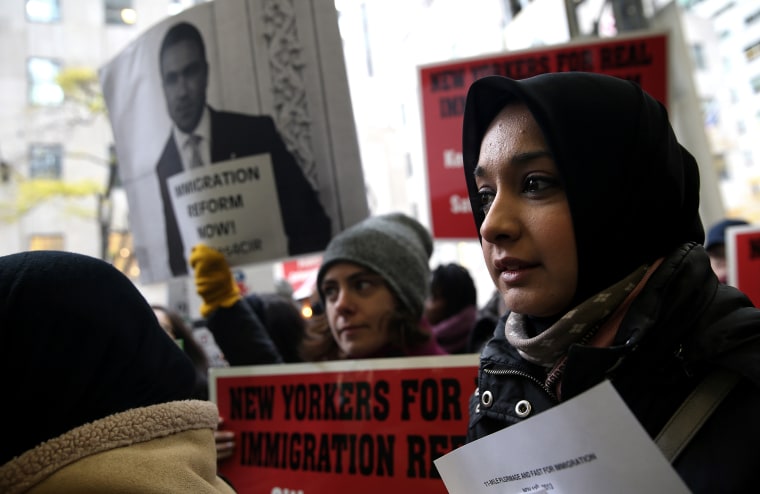House Republican leaders announced last week that immigration reform is off the table in 2013, as the schedule is too crowded by...something. Next year, when a series of budget deadlines come due and election season begins, doesn't look much more promising. And now John Boehner is sounding a hard line, telling reporters on Wednesday that the House won't go to conference with the Senate to work out a joint immigration plan, something advocates were hoping would be their endgame.
None of this is too worrying to most Republican members, who are packed into safe seats with few Latino or Asian constituents. Republican districts actually grew whiter after the last round of redistricting. But there are a handful of Republicans directly affected if immigration talks collapse--and they're starting to get nervous.
Pollster Latino Decisions has identifed 44 Republican districts with a significant "Latino influence," but only 14 where Latino voters strongly threatened the party's hold on the seat. The list of Republicans directly endangered by immigration reform dying in 2014 is probably even smaller--maybe even half that--but as demographic trends continue to reshape the electorate, it could encompass more seats over time.
Those members whose seats might be affected are taking increasingly visible steps to insulate themselves if reform dies this year.
The most obvious example is the three Republicans who have signed on to a Democratic immigration bill backed by Nancy Pelosi. The legislation, HR 15, is mostly modeled after the Senate immigration bill that House Republicans long ago declared DOA. Over the last month, Representatives Jeff Denham and David Valado of California and Ileana Ros-Lehtinen of Florida have announced their support for the bill. Ros-Lehtinen and Valadao hold Latino-majority districts, with the latter considered competitive by political analyst Charlie Cook, who ranks all House races. Denham's district, where 34.9% of the voting age population is Latino, is also ranked as a competitive district in 2014, although less so than Valadao's.
Congressman Joe Heck of Nevada publicly rebuked his own leaders for delaying action on reform in October, calling it "another example of the leadership vacuum in Washington that rightly has so many people frustrated with this dysfunctional Congress." The voting age population in Heck's district is 13.5% Latino and the seat is ranked as competitive.
Darrell Issa of California, whose district's voting age population is 22.2% Latino, announced around the same time that he was working on a bill to provide limited legal status to some undocumented immigrants. While much narrower in scope than the Senate's plan, which included a path to citizenship for residents who met certain requirements over time, it's the first Republican bill that would address their status at all.
Democrats and immigration advocates are doing everything they can to increase the pressure on these members before the window closes to pass a bill, hoping to push more Republicans into open revolt. The SEIU and AFL-CIO are funding pro-immigration ads in nine districts, including Denham's, Valado's, and Heck's.
Major immigration groups are also commissioning polls of battleground states and seats to showcase public support for reform. FWD.us, the pro-immigration group backed by Facebook founder Mark Zuckerberg, ran polls of likely voters in 20 Latino-heavy districts last week showing 76% support for a pathway to citizenship. The Partnership for a New American Economy, backed by Michael Bloomberg and Rupert Murdoch, recently published similar polling in battleground states.
As the prospects for reform weaken, it's likely that more affected Republicans will align themselves with the pro-immigration caucus. That could lend the reform cause momentum. But it could just as easily convince House leaders that the best way forward is to appease the tea party by killing the legislation while encouraging endangered members to disagree--enabling them to run on their public dissent.
That approach, perhaps the most likely one, might work out in the short term. In the long term, every day, month, and year Republicans find an excuse not to enact immigration reform only digs the national GOP into a deeper hole.
